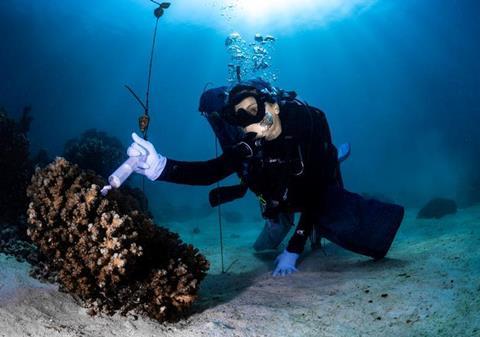Marking World Coral Reef Day on June 1, AMI’s Rachel Carson Prize winner Professor Raquel Peixoto reveals how the ability of corals to tolerate rising temperatures is determined by the type of microorganisms that live inside them.
A breakthrough study led by Proessor Peixoto and a team of researchers at King Abdullah University of Science and Technology (KAUST) paves the way for developing coral probiotics that can protect if not resuscitate and help restore coastal reefs and thus the fisheries, tourism and other industries that depend on these colorful ecosystems.

Among the many vulnerable lives of the sea to climate change, none are more so than corals. Rising temperatures are causing corals to die at an alarming pace, with experts expecting nearly 90% of the coral population to vanish by midcentury. Moreover, although corals make up only 1% of the sea floor, perhaps none are more valuable, as scientists estimate over 30% of sea life depends on them, and more than a billion rely on them economically.
READ MORE: Dr Raquel Peixoto named as winner of the inaugural Rachel Carson Prize 2023
READ MORE: Under the microscope: ocean degradation and climate change
Corals depend on a symbiotic relationship with microorganisms that live inside their cells. The corals and microorganisms nourish each other, allowing both to survive and reproduce. Rising ocean temperatures compromise this symbiosis, resulting in coral bleaching, a phenomenon in which the microorganisms are expelled from the corals, causing the corals to lose their rainbow colors. Bleaching represents a high risk for death, and even a temperature rise of just a single degree Celsius is enough to trigger this event. But, with proper intervention, bleaching is reversible.
Coral microbiome
KAUST Professor Raquel Peixoto, who led the study, is a leading expert on coral sustainability, especially with regards to probiotics, which are medical formulations that replenish the symbionts. Much as the human microbiome – the collection of microorganisms, including bacteria, fungi, and algae, in our guts – affects human health, the coral microbiome is recognized as critical for coral health. Peixoto is studying coral microbiomes to best prepare her coral probiotics.
“In a way, we’ve managed to crack nature’s code, revealing what microbes are naturally selected by corals to resist heat stress. Corals with a special combination of specific ‘microeukaryotes’ and bacteria in their microbiome were more resistant to heat,” she said.
Peixoto emphasized that KAUST’s work builds on decades of research into coral probiotics. “We have been successfully selecting effective probiotics for some time, but these findings enable us to enhance and accelerate the process. Nature already uses probiotics as a solution, and we’re leveraging these insights to enhance and speed up nature’s work in response to climate change,” she explained.
Thermal resistant and thermal sensitive
In the recent study, Peixoto, KAUST scientist Erika Santoro and their colleagues found that the coral species Mussismilia hispida, which is native to her homeland Brazil and critical for many of the reefs in that region, could be divided into corals that were thermal resistant and thermal sensitive, a difference the researchers found could be attributed to their microbiomes. In the microbiome of the thermal resistant corals, microeukaryotes were more abundant and had a stronger influence on the animals’ metabolism and microbiome, while in their thermal sensitive cousins, bacteria were more abundant and had the stronger effect.
The scientists believe that by studying microorganisms that correlate with the ability of corals to tolerate rising temperatures gives important clues into the design of coral probiotics. “We now have an arsenal of information on how nature selects the microbiome to make corals more resistant to thermal stress. The new data will greatly enhance our screening system and select more powerful probiotics,” said Santoro.
This research highlights the critical role of coral probiotics in restoring degraded reefs and boosting their resilience. Peixoto added, “Probiotics are a powerful tool not just for protecting corals but also for accelerating their growth and resilience in restoration efforts. By understanding and enhancing nature’s own mechanisms, we can better equip corals to survive in the face of climate change.”
The research has been carried out following the establishment of the first coral probiotics village in the Red Sea.
Coral probiotics village
Launched by KAUST in 2021, the village, located around 20 km off the campus shores, is part of the University’s Red Sea Research Center (RSRC) efforts and approach to coral preservation and restoration.
Raquel and her team are building a repository of characterized microorganisms collected from different marine environments of the Red Sea, which is a unique environment and very important source of microbial diversity. This microbial collection will represent a biobank of different marine microorganisms with the potential to be used as mitigators of environmental stress, aquaculture probiotics, agents for environmental restoration and rehabilitation, among others.
The main goal of the RSRC Coral Probiotics Village (CPV) is the development of long-term surveys that can improve our knowledge on different aspects of reef ecology, diversity, and dynamics.







No comments yet